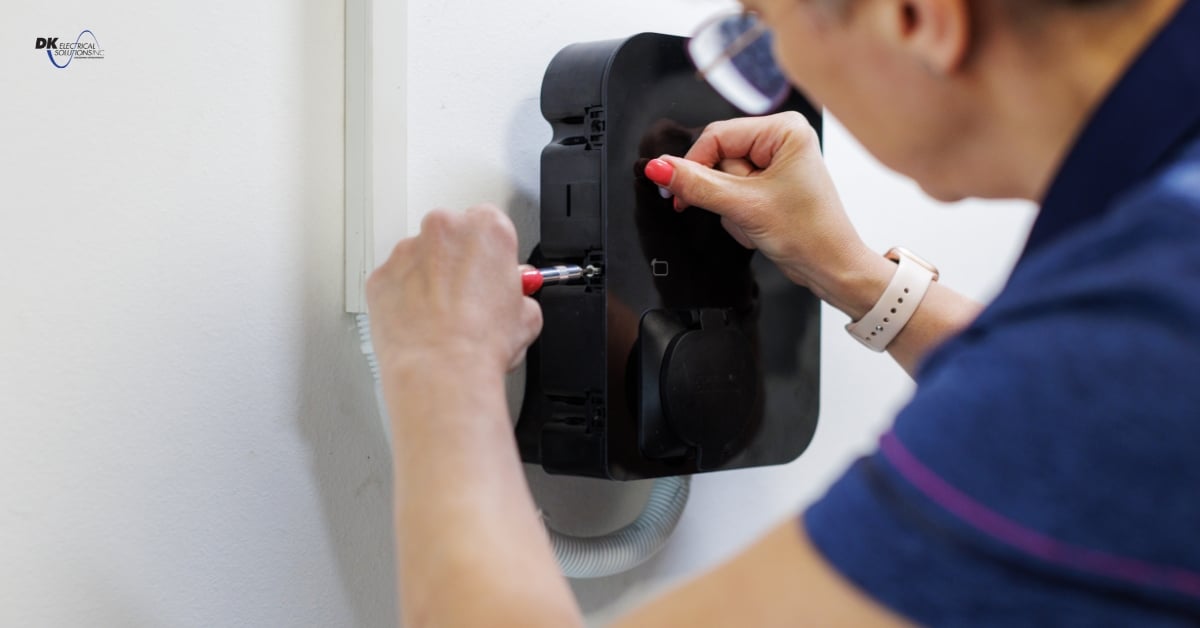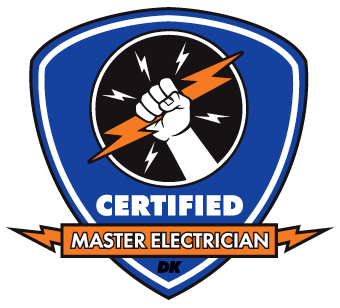
Are you a Burlington County, NJ, or Camden County, NJ resident, considering an electric vehicle (EV) as your next car purchase, or have you recently bought one? You’re on the right track towards a greener and more sustainable future! But have you considered the convenience of installing an electric car charging point at your home? DK Electrical Solutions, a trusted electrical service provider in South Jersey, is here to guide you towards efficient and sustainable car charging.
Why Consider Home Electric Vehicle Charger Installation?
Having your own electric car charging station at home offers numerous benefits. It adds convenience, increases the value of your property, and contributes to a reduced carbon footprint.
Factors to Consider When Installing an EV Charging Station at Home
When considering electric car charger installation, there are several key factors to keep in mind.
Your Electrical System
Your existing electrical system’s capacity plays a critical role in determining the type of EV charger you can install. Our team can perform a detailed inspection and provide upgrades if necessary.
Type of Charger
From Level 1 to Level 2 chargers, the type of charger you choose will depend on your vehicle type and how fast you want to charge.
Location of Charger
The charging point should ideally be near your parking area for easy accessibility. As certified electricians, we ensure safe and efficient electric vehicle charger installation.
Cost to Install Electric Car Charger
The cost of installation can vary based on several factors, including the type of charger, your electrical system’s capacity, and the installation’s complexity. DK Electrical Solutions provides competitive pricing and financing options for your convenience.
Entrust Your EV Charger Installation to Professionals
Certified professionals should always handle electric car charging station installation to ensure safety and efficiency. Our team at DK Electrical Solutions is ready to assist you, providing high-quality services tailored to your specific needs.
FAQ’s
What is the process involved in an EV charging station installation?
The EV charging station installation process involves a few steps. First, an inspection of your electrical system is performed to ensure it can handle the additional load. Then, a suitable location is chosen for the installation. Necessary permits are obtained before the installation begins, including mounting the charging station, setting up the wiring, and testing the unit for functionality.
How does a home EV charging station differ from a public one?
Home EV charging stations are typically Level 2 chargers, providing a convenient, reliable, and faster charging solution at residential properties. Public charging stations, on the other hand, can range from Level 2 chargers to DC fast chargers. They are located in commercial areas and are designed to serve multiple EV plugs.
What are the requirements for EV charging station installation at home?
The primary requirement for a home EV charging station is a dedicated electrical circuit of sufficient capacity. The installation location should have good connectivity to the electrical panel and be easily accessible to your vehicle. In some locations, like New York and New Jersey, permits may be required.
Can I undertake the EV charging station installation as a DIY project?
While it’s possible, EV charging station installation is best handled by professionals due to its complexity. A professional installation ensures that all electrical and safety standards are met, and the system operates optimally.
How much does it typically cost to install an EV charging station?
The cost of an EV charging station installation can vary, depending on factors like the charger type, required electrical work, and local installation rates. On average, the cost ranges from $500 to $1,200, not including the price of the charger itself.
Are there any specific regulations or codes governing EV charging station installation?
Yes, there are regulations and codes that govern the installation of EV charging stations. These can vary by location and cover aspects like permits, safety measures, and equipment specifications. Always check with your local municipality in areas like New York or New Jersey.
How long does it take to install an EV charging station?
The installation time can vary based on the complexity of the installation and the condition of your home’s electrical system. On average, the installation can be completed within a few hours.
What are the different types of EV charging stations that can be installed?
There are primarily three types of EV charging stations: Level 1, Level 2, and DC Fast Chargers. Level 1 chargers use a standard electrical outlet, while Level 2 chargers need a dedicated circuit and offer faster charging. DC Fast Chargers are commercial-grade chargers providing the quickest charging times.
How much space is needed for EV charging station installation?
An EV charging station doesn’t require much space. However, you must ensure there’s enough room for the vehicle to park and for the charging cable to reach the vehicle’s charging port comfortably.
What factors should be considered when deciding the location of an EV charging station?
When choosing a location, consider proximity to your electrical panel, the parking spot of your EV, and protection from elements. The station should be installed where the cable can easily reach the EV plug without any strain.
How can an EV charging station impact my home’s electrical system?
An EV charging station increases the electrical load on your home’s system. If your home’s electrical system is older or already near capacity, it might need an upgrade to handle the additional load safely.
What maintenance is required after an EV charging station installation?
EV charging stations require minimal maintenance. It is recommended to periodically clean the charging point and inspect the cables for any damage. Some models may also allow for software updates to enhance their functionality.
Are there any safety considerations to keep in mind during an EV charging station installation?
Safety is paramount during an EV charging station installation. Only a certified electrician should perform the installation, ensuring all electrical connections are secure, the unit is properly grounded, and all local code requirements are met.
What are the benefits of professional EV charging station installation?
Professional installation ensures safety, reliability, and compliance with local codes. Professionals can also provide guidance on the best charging station type and location for your specific needs. They will handle all the aspects, from electrical work to final testing.
Will EV charging station installation increase the value of my property?
Yes, installing an EV charging station can boost your property’s value. As more people switch to electric vehicles, having a home charging station becomes an attractive feature for potential buyers, particularly in eco-conscious markets like New York and New Jersey.
Facts about EV charging station installation
- Electric vehicle (EV) charging station installation is a process that involves setting up the necessary infrastructure to charge electric vehicles.
- It is important to consider the location and accessibility of the charging station. Factors such as proximity to main roads, parking availability, and visibility should be taken into account.
- The charging station should be installed in compliance with local regulations and codes. It is essential to obtain the necessary permits and approvals before starting the installation process.
- The charging station requires a power source, typically electricity from the grid. It is important to assess the electrical capacity and ensure that it can support the charging station’s requirements.
- Different types of charging stations are available, including Level 1, Level 2, and DC fast charging stations. The choice of the charging station type depends on factors such as charging speed, vehicle compatibility, and budget.
- The installation process may involve trenching and laying underground conduits for electrical wiring. It is important to hire a professional electrician to ensure proper installation and safety.
- Charging stations may require additional equipment such as charging cables, connectors, and charging management systems. These components should be selected based on compatibility with the charging station and the vehicles to be charged.
- Ongoing maintenance and monitoring of the charging station are important to ensure its proper functioning. Regular inspections, cleaning, and repairs should be conducted to keep the charging station in optimal condition.
- It is recommended to work with experienced professionals or companies specializing in EV charging station installation to ensure a smooth and efficient process.
- Installing EV charging stations can provide various benefits, including attracting customers, supporting sustainability initiatives, and contributing to the growth of the electric vehicle market.
Jumpstart Your EV Journey Today!
Ready to enjoy the convenience of home charging? Get a quick quote, a fast estimate, or schedule an appointment for your EV charger installation. Transition to a greener future with ease and convenience with us by your side.
Your Trusted Electrical Experts in South Jersey
At DK Electrical Solutions, we uphold the highest standards of quality and customer service in all our electrical services. We’re your go-to providers in Burlington County, NJ, and Camden County, NJ, for everything from wiring and re-wiring, lighting install and repair, fan installation, to generator installation. Let us light up your way to a future powered by clean and renewable energy. Connect with us today at (609) 796-4177!
Download PDF
